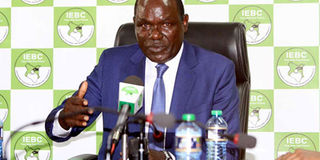Without reforming elections, BBI will not yield much fruit

Independent Electoral and Boundaries Commission Chairman Wafula Chebukati holds a meeting with journalists at Anniversary Towers on October 9, 2019. The agency must be reformed for credible polls to occur. PHOTO | FILE | NATION MEDIA GROUP
What you need to know:
- Any attempt to reform the conduct of elections must come up with a clear prescription for the resourcing of the IEBC.
- Without entrenching a culture of credible elections in Kenyan politics, post-election conflict is almost inevitable.
After President Uhuru Kenyatta handed the Building Bridges Initiative (BBI) Task Force a new lease of life recently, its report is likely to continue dominating national debate.
This is as it should be: Kenyans need to be given an opportunity to have a say in the governance of their country, which, based on current evidence, is constantly evolving.
But the structure of the ongoing discourse, which is largely being executed through unmoderated speeches by politicians and their kindred types at town hall meetings and public rallies, may not yield the desired result of critiquing and enriching the document.
What we have seen so far, if the Kisii and Kakamega editions are a template, is a choreographed acclamation of the document as a panacea for all our governance challenges as a country, and vilification of anyone perceived to be opposed to it.
In the already charged political atmosphere, punctuated with deep schisms triggered by 2022 succession politics, the opportunity to improve the report will be lost.
The existing version will be elevated into the Holy Writ and shouted into acceptance, warts and all. And it is deeply infested with warts.
ELECTORAL HEADACHE
Based on the task force’s report and pronouncements of its prime movers, President Kenyatta and former prime minister Raila Odinga, the biggest shortcoming of the BBI is its narrow definition of Kenya’s governance conundrum.
True, the winner-takes-all structure of our electoral system presents a huge challenge.
So is the apparent exclusion of a huge chunk of the population from national leadership and opportunities.
But perhaps the biggest threat to our collective national project in recent years has been our inability to hold credible elections.
Electoral theft, real or perceived, especially at the presidential level, has been at the heart of our post-election conflicts, with our last peaceful election being in 2002.
During that election, in which a united opposition coalition led by Mwai Kibaki whitewashed Moi’s protégé Uhuru Kenyatta, the coalition peopled every nook and cranny of government.
True, the winner took all but it did not trigger conflict; only euphoric joy from a populace long shackled by 24 years of Moi’s misrule and tyranny.
LEGITIMACY
Such peaceful transitions have been institutionalised through largely credible elections in countries like Botswana and Ghana, despite the latter’s penchant for close contests.
True to recent form, disputed presidential election results were the trigger for the fratricidal mayhem that has consistently been the aftermath of Kenya’s elections in 2007, 2013 and 2017.
During our last attempt to hold a credible presidential election, the results that had President Kenyatta in the lead were annulled by the Supreme Court in an unprecedented show of mettle by the Judiciary of an African state.
The President’s closest challenger Raila Odinga would boycott the rerun ordered by the court.
In a race akin to running against himself, President Kenyatta garnered the necessary numbers to claim the presidency but lost the most critical ingredient in governance: legitimacy.
It is this realisation and the possibility of long-drawn protests by the opposition, which were threatening to make the country ungovernable, that eventually forced the President’s hand into an unlikely rapprochement with his erstwhile enemy, birthing the so-called Handshake or Building Bridges Initiative (BBI).
REFORM IEBC
True, the BBI Task Force’s report pronounces itself on the issue of elections, with its headline recommendation being the disbandment of the current Independent Electoral and Boundaries Commission (IEBC).
But without clear prescriptions and national consensus on the constitution of the IEBC and the conduct of elections (especially tallying, which is the weakest link in Kenyan presidential polls), this solution is almost akin to changing pallbearers on the way to a certain grave.
There is no guarantee that the conduct of the next elections in 2022 will be any different.
There is no safeguard to ensure that the voting, and most importantly, the counting of votes, will be credible and the results acceptable to both winner and loser.
Any attempt to reform the conduct of elections must come up with a clear prescription for the resourcing of the IEBC and the systems and procedures to be followed in the execution of elections, including the deployment of technology.
Without entrenching a culture of credible elections in Kenyan politics, post-election conflict is almost inevitable and it will not matter how many executive posts are created to accommodate the ravenous greed of the political class and their supporting cast of ethnic elites.
Mr Akumu is a strategic communication consultant. E-mail: [email protected]




